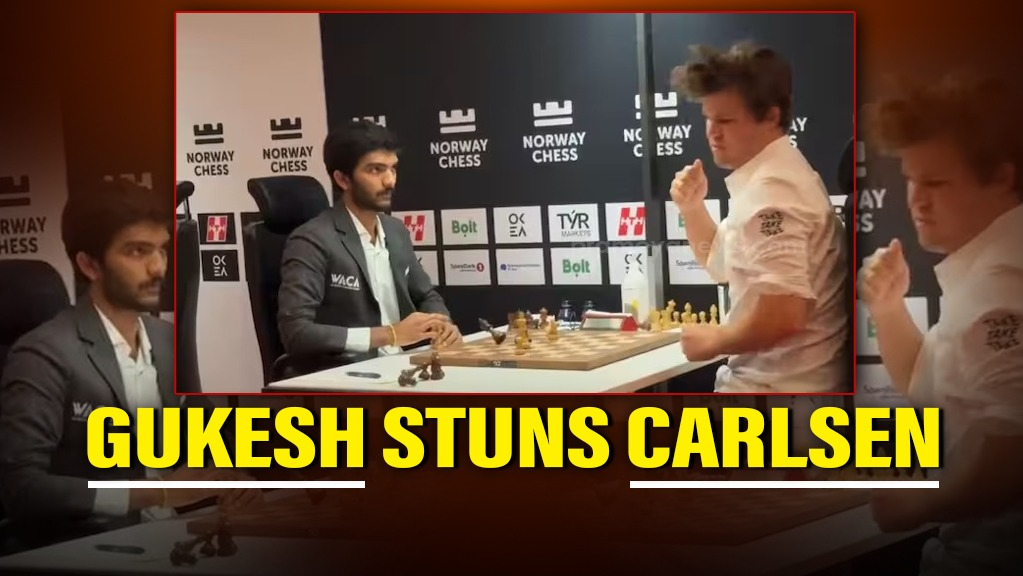

Stavanger, Norway – A noticeable tension filled the air in Stavanger on Sunday as reigning World Champion Dommaraju Gukesh secured a momentous first-ever classical win against an unusually rattled Magnus Carlsen. The sixth round of the prestigious Norway Chess tournament witnessed a dramatic turn of events, culminating in an emotional display from Carlsen and a significant shift in the tournament matrix.
The match itself was a rollercoaster. Carlsen, playing with the black pieces in front of his home crowd, initially appeared to be in a commanding position, skillfully pressing his advantage. For a significant portion of the game, the Norwegian stalwart seemed poised to extend his dominance. However, Gukesh, the Indian teenage sensation, demonstrated remarkable resilience and defensive acumen. Under immense pressure, he maintained his composure, meticulously navigating the complexities of the position.
The turning point arrived in the endgame. As both players contended with the tournament's increment time control – designed to mimic the faster pace of rapid play – Carlsen committed a rare and critical blunder. Gukesh, alert and precise, seized the opportunity with a decisive counterattack, converting his advantage into a memorable victory. The outcome was so unexpected that Gukesh himself seemed taken aback, later admitting he was still processing the magnitude of his achievement and the dramatic conclusion to a game he had been defending for the most part.
Carlsen's reaction to the defeat was immediate and visceral. Visibly devastated, the World No. 1 reportedly slammed his fist on the table in frustration before hastily exiting the competition venue. This outburst, while dramatic, offered a glimpse into the intense pressure and personal stakes involved, especially given Carlsen's earlier dominance in the tournament and his history with Gukesh. Just days prior, Carlsen had secured a convincing win against Gukesh in the opening round, after which he shared a cryptic social media post stating, "You come at the king, you best not miss," widely interpreted as a reference to his own status in the chess world.
This defeat was described by chess commentators, including legendary Grandmaster Susan Polgar, as potentially one of the "most painful" in Carlsen's illustrious career. Polgar highlighted the rarity of Carlsen losing in classical chess, especially from a winning position and with more time on the clock. She noted his uncharacteristic major blunder under time pressure as a key factor, emphasizing that Gukesh's persistence in a difficult position paid off. Carlsen had previously been critical of Gukesh's classical play and his ability to handle incremental time controls, adding another layer to the significance of this particular encounter.
Gukesh’s triumph marks the second consecutive year an Indian teenager has bested Carlsen in the classical format at Norway Chess, with R Praggnanandhaa achieving the feat in the previous edition. This victory was not just a personal milestone for Gukesh, who equalised his classical score against Carlsen, but also a significant moment for Indian chess. The elation was evident as Gukesh greeted his long-time coach, Grzegorz Gajewski, with an enthusiastic fist bump, underscoring the importance of the win.
The result has undeniably sent ripples through the tournament standings. Prior to this round, Carlsen held a comfortable lead. Gukesh's win, however, has injected fresh intrigue into the race for the title as the event heads into its final, decisive rounds. The day also brought further success for the Indian contingent, with Arjun Erigaisi defeating Chinese Grandmaster Wei Yi.
This clash was Carlsen's first classical appearance since Gukesh became the youngest world champion in history last year, a title Carlsen himself opted not to defend after his fifth championship win. The dramatic events in Stavanger highlight the ever-evolving landscape of elite chess, where youthful talent consistently challenges established champions, promising an exciting future for the sport. The combination of high-stakes competition, personal rivalries, and the sheer unpredictability of outcomes continues to captivate chess enthusiasts worldwide.